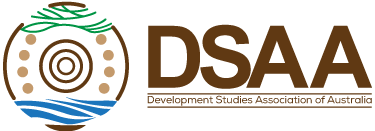The more radical the person is, the more fully he or she enters into reality so that, knowing it better, he or she can transform it. This individual is not afraid to confront, to listen, to see the world unveiled. This person is not afraid to meet the people or to enter into a dialogue with them. This person does not consider himself or herself the proprietor of history or of all people, or the liberator of the oppressed; but he or she does commit himself or herself, within history, to fight at their side.
– Paulo Freire, Pedagogy of the Oppressed
Most learning is not the result of instruction. It is rather the result of unhampered participation in a meaningful setting.
– Ivan Illich, Deschooling Society
Kearrin Sims
Since completing my PhD in 2015, I have witnessed Australia’s development studies community thriving. We have faced many substantial challenges across higher education and landscapes of development policy and practice that should not be glossed over, but amidst the hardship there has also been notable achievements.
Amongst such achievements have been the 2019 formation of the Development Studies Association of Australia (DSAA) and the Australasian Research Council’s (ARCs) recent announcement of a Field of Research (FOR) code for development studies.
Alongside the DSAA, the Research for Development Impact (RDI) Network, IAG Critical Development Studies Group, and Melbourne-based Critical Development Studies Network have all continued to make valuable contributions to the field, including RDI Network’s ever-expanding collection of reports and guidance documents.
Through the work of these, and many other important actors, we have also seen a notable increase in dialogue and partnerships across academia, policy and practice. I see flourishing here what Pablo Yanguas has described as an ‘epistemic development community’ that is united around shared normative goals, shared causal or explanatory beliefs, shared notions of what is valid proof, and a common set of policy practices (2018: 155).
We must, of course, ensure that development studies continues to be shaped by a plurality of voices and ideas. Shared goals and causal beliefs should never equate to the erasure of difference. But expanding solidarity and dialogue across the field is also something to be celebrated.
And now, just 244 words in, I will get to the key point of this post!
One space where I see opportunity for our Austral(as)ian epistemic development studies community to build further collaboration, is in learning and teaching. This post is a call for blog submissions on development studies learning and teaching.
I am primarily seeking short (max. 1,000 word) pieces that are written in accessible language, and that explore an aspect[s] of learning and teaching that can be shared with colleagues to promote constructive dialogue. Suggestions for alternative creative contributions (photo essays, short videos, fieldwork vignettes, etc.) are also welcomed.
Possible contributions may include (but are not limited to):
- COVID-19 and development studies pedagogy
- Teaching online: Pros, cons, and ‘how-to’s’
- Conversations about power and voice in learning and teaching
- Drawing in voices and perspectives of people experiencing development as educators/lecturers
- Experiences of settler-colonialism in Australia
- Breaking down ‘classroom’ learning by modelling processes of engagement, practice, and reflection in teaching modes and content
- Case-study resources
- Discussion of ‘threshold concepts’ (for example, privilege) that students need to comprehend in order to have the required sensibilities to do development work
- Learning and teaching development studies within regional universities
- Decolonisation, and the usage of development publications from the Global South
- Sharing reading lists, calls for readings, and other resources
- Unorthodox teaching practices
- Comments on core competencies and skillsets
- The effects of changes to Australia’s higher education landscape on development studies programs
- Accreditation for development studies: Pros, cons, and ‘how-to’.
- Examples of outstanding student work or student-academic co-collaborations
- Teaching-practitioner partnerships
- Practitioner insights for development studies pedagogy (e.g. what skillsets are needed in graduates)
- Reflections on past, or notifications about future, development studies pedagogy events, workshops, etc.
- Reviews of relevant books/articles
- HDR supervision in development studies
- Curriculum design
- Development studies, global citizenship education, and/or New Colombo plan projects
- Critical pedagogies and/or dialogical learning practice
- Work-integrated and service learning
This blog is a small effort to contribute to the many other recent and ongoing activities being undertaken to promote development studies learning and teaching collaborations within and beyond the academy (for example, see this and this). Hopefully, it will provide insights and facilitate partnerships that will improve our teaching practices, and allow us to better adapt/respond to an increasingly neoliberal higher-education environment.
If you are interested in contributing to the blog, please contact me with a pitch, questions, or a completed piece at: kearrin.sims@jcu.edu.au
There is no deadline for submissions, and publication of accepted pieces will be staggered in an effort to keep the webpage dynamic. DSAA does not seek ownership of any published material, so you are also welcome to re-publish your submissions elsewhere.
For all contributions, please include your name, title, and institution. Images (with copyright approval) to accompany any written submissions are also greatly appreciated.
Thank you.
Kearrin
Kearrin Sims is a lecturer in development studies at James Cook University (JCU), and coordinator of JCU’s Master of Global Development. He is also an executive committee member of the Development Studies Association of Australia and the Research for Development Impact Network.
For more on Kearrin’s work see:
https://www.rethinkingdevelopment.net/
